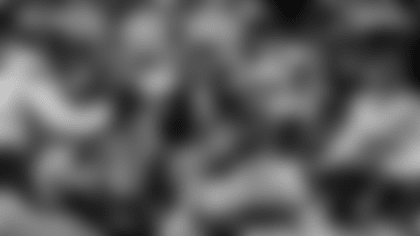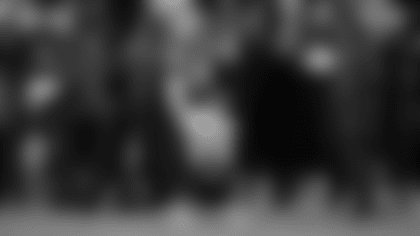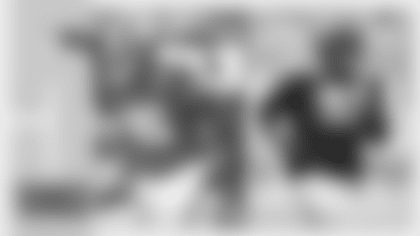Special teams coordinator Shawn Slocum, seen here during a training camp practice with a microphone attached near his cheek, sets up the kickoff return unit during a special teams drill.
Shawn Slocum couldn't ask for a better opportunity to make a good first impression.
The Packers' new special teams leader, put in charge of turning around units that in Head Coach Mike McCarthy's words "took a step back" in 2008, has a whale of a challenge in his debut as an NFL coordinator on Sunday night.
The Chicago Bears bring to Lambeau Field not only the best special teams units in the NFC North in recent years, featuring return dynamos in Devin Hester and Danieal Manning and veteran legs in kicker Robbie Gould and punter Brad Maynard, but also a group that has regularly made game-changing plays against the Packers in the McCarthy era.
"I think they do a great job," Slocum said of Chicago. "I love the way they play. Just from a football fan's standpoint, I like the way they play. Now, we're going to play highly combative special teams regardless of who we play. We need to be productive, and it just so happens we're playing a very good unit."
One that has given Green Bay fits. The Bears have won four of six games against the Packers in McCarthy's three years as head coach, and in each of those four victories, Chicago's special teams have tilted the game on at least one, and often more than one, occasion.
Of all people Slocum, who was Green Bay's special teams assistant the past three years before replacing the retired Mike Stock this season, doesn't need to be reminded of the laundry list of special-teams impact plays that have helped Chicago record four times more victories against the Packers than the other two division rivals combined (Minnesota 1, Detroit 0) in those last three years.
But to help illustrate just how important special teams might be as the 2009 season kicks off Sunday night, here goes:
Sept. 10, 2006: Hester runs a punt back 84 yards for a touchdown in the fourth quarter, punctuating Chicago's 26-0 win.
Oct. 7, 2007: Charles Woodson fumbles at the end of a 25-yard punt return and Chicago recovers, setting up the game-tying field goal early in the fourth quarter. The Bears eventually triumph, 27-20.
Dec. 23, 2007: The Bears block two punts, returning one for a TD, and Packers punter Jon Ryan fumbles another snap and shanks another punt off his shin. The miscues lead to 14 points total in Chicago's 35-7 victory.
Dec. 22, 2008: Manning answers a Green Bay touchdown with a 70-yard kickoff return to set up a second-quarter field goal. A Maynard punt bounds off the leg of Jarrett Bush while blocking an outside gunner and the Bears recover, giving their offense a short field and eventual third-quarter touchdown. Then in the fourth quarter, Jeremy Kapinos hits a poor 33-yard punt that Hester returns 24 yards for a net of just 9, giving the Bears good position near midfield to drive for the game-tying score. And when the Packers have a chance to erase it all with a go-ahead field goal late, Chicago's Alex Brown blocks Mason Crosby's 38-yard try with 18 seconds left, and the Bears eventually prevail in overtime, 20-17.
Last year's late-season Monday night showdown was obviously the most glaring example of Chicago's game-changing abilities. All 17 of the Bears' points in regulation were set up by key special teams plays, and the game went to overtime because of another one.
It was the kind of loss that a special teams coach never forgets, and the kind that provides ample motivation for a coach trying to put his own stamp on his units.
"It's very frustrating when we're not productive," Slocum said. "We go into a game with a plan, and we expect to execute that plan.
"But really it's not just about playing the Bears, or just about this game or that game. It's about an entire body of work that begins back in March when we started building this football team and putting our process together."
That process included many of the final roster decisions made last week coming down to special teams contributions. That is often the case, but it was even more pronounced this year.
The Packers kept three fullbacks on the 53-man roster, primarily because veterans Korey Hall and John Kuhn were both too valuable on special teams to let go. Receiver Brett Swain was kept instead of Ruvell Martin because of his special-teams potential. And special teams ace Spencer Havner has cross-trained at tight end and linebacker, carving out a roster spot for himself.
In the unlikely event any of them forgot, all of the players this week have seen film of Chicago's special teams prowess in the recent head-to-head meetings. They know the one-sidedness in that aspect of the rivalry cannot continue.
"We've gone over extensively everything that's happened over the last couple of years," Havner said. "We definitely want to put an emphasis on playing well on special teams and helping us win the game. We need to make sure we get positive field position and hopefully create turnovers, and not give the ball up."
The challenge is heightened this week by the potential absence of Will Blackmon, the team's top kick and punt returner and a key coverage man. Blackmon bruised his quadriceps in the second preseason game against Buffalo and hasn't practiced since, leaving his status for Sunday up in the air. Receiver Jordy Nelson and cornerback Tramon Williams would likely handle the return duties should Blackmon be unavailable, with running back DeShawn Wynn (kickoffs) and Woodson (punts) other possibilities.
{sportsad300}The players would love nothing better than to get Slocum's tenure off on the right foot Sunday. A former special teams coordinator at USC and Texas A&M, Slocum made sure in training camp his instructions were heard loud and clear, first by using a megaphone to run his drills and then by speaking into a microphone wired to the practice field's PA system.
The latter effort has continued during this first week of the regular season, making Slocum's booming voice at a closed practice at the very least a symbolic representation of just how strongly the Packers are stressing special teams in 2009.
"I definitely think there's good communication there," long snapper Brett Goode said. "He just wants us to go out there and play fast, and not worry as much about making a mistake. But go out there, play fast and make sure we handle our business and do our job.
"Going into every game you know it can be a difference-maker, especially with the hidden yardage and everything."
And the not-so-hidden big plays the Bears have been known to make.
"What better way (to start) than to go against a special teams unit that has been very good, particularly against us, in the past," McCarthy said. "Special teams is the one area I feel the Bears have done a better job than we have over the last few years. This is definitely an area of emphasis for our football team."














